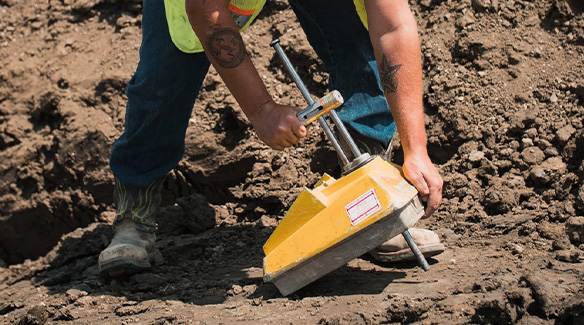Why the Engineer of Record is Essential for Project Compliance and Security
Why the Engineer of Record is Essential for Project Compliance and Security
Blog Article
Recognizing the Crucial Role of the Geotechnical Industry in Modern Building And Construction Projects and Framework Development
The geotechnical sector is a cornerstone of modern building and framework growth, providing crucial understandings right into dirt actions that straight influence project outcomes. With sophisticated dirt evaluations and cutting-edge design remedies, geotechnical specialists not only guarantee structural stability however likewise address sustainability worries amidst progressing ecological criteria.
Relevance of Dirt Evaluation
Soil evaluation plays an important duty in the geotechnical market, functioning as the foundation for notified decision-making in building projects. Accurate dirt examination is essential for identifying the viability of a website for different types of structures, consisting of household homes, business buildings, and bridges. By evaluating soil composition, stamina, density, and moisture web content, engineers can anticipate possible difficulties and mitigate threats connected with ground instability, erosion, and negotiation.
The evaluation process commonly includes a series of examinations and observations that give crucial details regarding the subsurface problems. This data educates the style and construction procedures, guaranteeing that frameworks are improved strong ground with sufficient support. Comprehending the soil profile allows designers to choose ideal building approaches and materials, enhancing source utilization and lessening prices.
Along with guaranteeing architectural honesty, soil evaluation adds to ecological sustainability. By identifying prospective contamination or damaging effects on surrounding ecological communities, engineers can apply strategies to safeguard these natural deposits. Overall, extensive dirt analysis is indispensable in the geotechnical field, underpinning the security, effectiveness, and environmental obligation of building and construction tasks.
Trick Geotechnical Techniques
A variety of essential geotechnical techniques are utilized to examine and improve the security and performance of construction sites. One foundational method is dirt tasting and screening, which permits designers to establish the physical and chemical buildings of the ground. This details is essential for making educated choices relating to structure style and building methods.
Another essential method is site characterization, which involves the comprehensive assessment of dirt and rock problems with methods such as borehole exploration and in-situ screening. Methods like Standard Infiltration Examinations (SPT) and Cone Penetration Examinations (CPT) give valuable information on dirt strength and stratigraphy.
Ground renovation strategies, such as soil stabilization and grouting, are likewise crucial in improving the load-bearing capacity of weak soils. These techniques can alleviate negotiation and boost total website conditions.
In addition, incline stability analysis is vital for determining potential landslide risks and making certain the safety of excavations. This evaluation frequently utilizes numerical modeling and restriction balance methods to anticipate dirt actions under different problems.
Incorporating these geotechnical methods into construction planning not only optimizes job outcomes yet also guarantees the long-term sustainability of framework development.
Influence On Construction Security

Additionally, efficient geotechnical design involves applying reduction methods for determined threats. This may include dirt stablizing methods, retaining frameworks, or drain systems to alleviate hydrostatic pressure. By dealing with these aspects, building and construction groups can lower the possibility of accidents and boost employee security.
In addition, continuous monitoring of site conditions is vital during construction. Geotechnical instruments can provide real-time data regarding ground activity and security, enabling timely treatments when required.
In essence, the geotechnical sector plays an essential function in safeguarding building and construction projects. By focusing on ground stability and employing extensive analysis techniques, the geotechnical field not only safeguards the workforce but also adds to the long life and integrity of constructed infrastructure.
Sustainability in Geotechnical Practices

In addition, geotechnical engineers are now employing advanced innovations, such as geosynthetics, which boost soil stability while reducing the quantity of product called for. This not just saves resources however likewise results in less waste generation (tailings engineer). The assimilation of lasting design concepts right into geotechnical engineering encourages using renewable resource resources in construction processes, even more lowering carbon discharges
Furthermore, comprehensive website evaluations are crucial for determining possible ecological engineer of record effects prior to construction begins. By carrying out these analyses, geotechnical experts can establish methods that mitigate negative effects, ensuring compliance with ecological guidelines. On the whole, the focus on sustainability within geotechnical practices not just adds to the longevity and resilience of framework but additionally promotes an accountable method to land and resource management. This dedication is crucial for promoting sustainable advancement in the contemporary building and construction landscape.
Future Trends in Geotechnical Engineering
Development is driving the future of geotechnical engineering, as arising technologies and techniques improve the sector. The combination of advanced information analytics and expert system is set to revolutionize site investigation and threat assessment, enabling engineers to make more enlightened decisions based on real-time data. The usage of geosynthetic products is getting traction, providing lasting remedies that enhance dirt security and decrease ecological impact - geo tech engineer.
An additional significant trend is the adoption of automated and robot systems for surveillance and building processes. These technologies not only enhance accuracy however additionally enhance safety and security by decreasing human involvement in harmful settings. Additionally, the application of Building Information Modeling (BIM) in geotechnical layout promotes improved collaboration amongst stakeholders, optimizing project delivery and reducing expenses.
As environment adjustment postures brand-new difficulties, the sector is significantly concentrating on strength and versatility in design techniques, guaranteeing framework can stand up to severe weather events. The continuous fad toward sustainability will certainly drive advancement in eco-friendly products and approaches, lining up geotechnical design with broader ecological objectives. Collectively, these trends will form a much more reliable, lasting, and resilient geotechnical landscape for future jobs.
Verdict

The geotechnical industry is a foundation of modern building and construction and facilities development, offering vital understandings right into soil habits that directly affect task results. geotechnical engineers.Soil assessment plays a critical function in the geotechnical sector, offering as the structure for informed decision-making in building projects. In general, comprehensive dirt analysis is vital in the geotechnical area, underpinning the security, effectiveness, and environmental duty of building tasks
Building and construction security is substantially influenced by geotechnical methods, as the security and honesty of the ground directly affect the total security of a building and construction website.In final thought, the geotechnical market is important in modern building and construction and framework growth, offering important evaluations that make sure architectural stability and safety and security.
Report this page